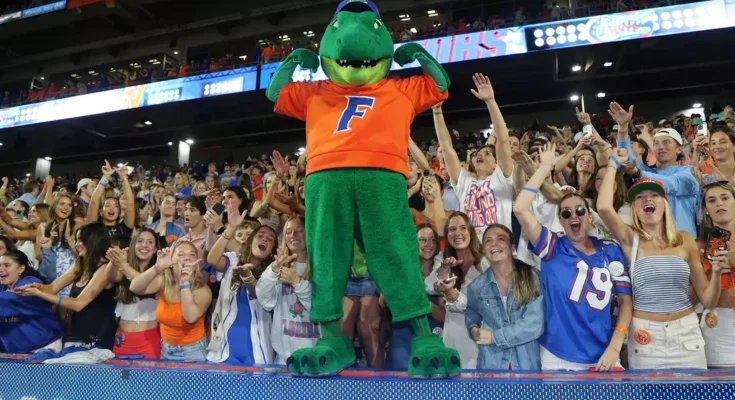University of Florida Makes History as First College to Introduce Facial Authentication for Express Entry at Florida Gators Games
In a groundbreaking move that combines cutting-edge technology with sports entertainment, the University of Florida has become the first collegiate institution to launch a facial authentication system for express entry to Florida Gators games. This innovative approach is set to revolutionize the fan experience, offering a faster, more secure, and contactless method for fans to enter the stadium. With this initiative, the university is not only enhancing convenience but also setting a new standard for the future of fan engagement at sports venues.
The decision to integrate facial recognition technology into the game-day experience comes as part of the University of Florida’s ongoing commitment to innovation and improving safety for its students, alumni, and other fans. With a history of leading advancements in higher education, the university has once again stepped forward, aiming to position itself as a trailblazer in the application of new technologies. As other universities and stadiums around the country watch closely, the Florida Gators’ fans are set to be the first beneficiaries of this visionary leap forward.
The concept of facial authentication is simple, yet highly effective. Fans will no longer need to fumble for their tickets, deal with long queues, or worry about losing physical tickets. Instead, they will simply approach one of the stadium’s designated entry points, where they will be scanned by high-tech cameras. The facial recognition system will compare their facial features to the ones stored in their accounts, allowing for quick and seamless access to the venue.
This new process eliminates the need for paper tickets or even mobile phones in many cases, replacing them with a fully automated system. The technology uses advanced algorithms and artificial intelligence to accurately identify individuals, ensuring that only authorized ticket holders gain entry. It also provides a heightened level of security compared to traditional ticketing systems, making it far more difficult for counterfeit tickets or fraudulent activity to occur.
For the fans, the most notable benefit of this system is the convenience it offers. With traditional methods, fans have to either print tickets, download them to a phone, or present them at the gates, all of which can result in delays and frustrations, especially during peak times before a game. Long lines are a common feature of stadium entrances, and these delays often put a damper on the excitement of the game day experience. With facial recognition, fans can now bypass these long queues and enter the stadium in mere seconds, increasing the overall efficiency of the event.
Beyond the fan experience, this technology also provides significant advantages for event organizers and security personnel. The ability to track entry data in real-time means that stadium staff can monitor who is entering and when, adding an extra layer of security. Additionally, the system allows for easier management of capacity limits, ensuring that no more fans are allowed into the stadium than it can safely accommodate. In the post-pandemic world, where contactless systems have become the norm, the introduction of facial authentication aligns with the growing need for hygienic, safe, and efficient crowd management solutions.
The University of Florida has partnered with several tech companies to implement this state-of-the-art system, drawing on their expertise in AI and biometric recognition. These partnerships highlight the university’s dedication to collaborating with industry leaders to create transformative experiences for its community. The Florida Gators, one of the most successful and beloved teams in college sports, now find themselves at the forefront of this technological revolution in sports entertainment.
Security is, of course, a primary concern when introducing a new technology that involves the collection and storage of personal data. However, the University of Florida has taken extensive measures to ensure that all fan data is securely handled and stored. The university has implemented stringent data protection protocols to safeguard personal information, ensuring compliance with relevant privacy regulations and industry standards. Fans can opt-in to the system, and their facial data is encrypted, stored in secure databases, and only used for the purpose of entry verification.
While some may have concerns about the privacy implications of facial recognition technology, the University of Florida has made it clear that the use of this system is entirely voluntary. Fans who prefer not to participate can still enter the stadium using traditional methods such as mobile ticketing or paper tickets. The university’s approach is designed to be inclusive, offering fans the choice of using the new technology or opting for a more conventional experience, ensuring that no one is excluded or disadvantaged.
The implementation of facial authentication at Florida Gators games also reflects the larger trend toward smart cities and smart venues, where technology is increasingly being used to enhance the way we live and interact with public spaces. From stadiums to airports and beyond, facial recognition is becoming a key component of future infrastructure. By embracing this trend, the University of Florida is not only improving the fan experience but also preparing its community for the technological advancements that are likely to become the norm in the coming years.
This new system also ties into the growing trend of “cashless” venues, where fans are encouraged to use digital payment methods for everything from concessions to merchandise. By streamlining the entry process with facial authentication, the University of Florida is continuing its push to create a seamless and modern game-day experience, where fans can enjoy more time in the stands and less time worrying about logistics.
In addition to the practical benefits, the introduction of facial authentication is also a statement of confidence in technology’s ability to enhance the fan experience. For many fans, attending a game is a highly anticipated event that requires significant planning and commitment. The streamlined entry process allows them to focus on what matters most – the game itself. Whether it’s tailgating with friends, cheering for their team, or simply enjoying the electric atmosphere of a live sporting event, the new facial authentication system is designed to enhance every aspect of the Florida Gators game day experience.
Looking forward, the University of Florida’s move toward facial recognition technology may have far-reaching implications beyond just the sports world. If the system proves to be successful, it could serve as a model for other universities and organizations to adopt. Given that the technology is already being used in various industries, its expansion into the college sports sector could be the beginning of a larger trend toward biometric security in everyday life. From accessing dorm rooms to entering classrooms or sporting events, facial authentication could become the gold standard for secure, efficient, and user-friendly identification systems across campus life.
Moreover, the university’s commitment to innovation is not confined to facial recognition alone. As part of their broader digital transformation efforts, the University of Florida is also exploring other emerging technologies such as artificial intelligence, machine learning, and virtual reality to further improve both the academic and extracurricular experiences of its students and faculty. With its forward-thinking initiatives, the university continues to prove that it is at the cutting edge of technological advancements in higher education.
In conclusion, the University of Florida’s introduction of facial authentication for express entry at Florida Gators games marks a monumental step forward in the intersection of sports, technology, and fan engagement. By embracing the latest innovations in biometric security, the university is not only enhancing the fan experience but also setting a benchmark for other institutions to follow. As this technology becomes more widespread, it is likely that facial recognition will become a staple of future game days, and the Florida Gators will be remembered as the pioneers who helped lead the way. This is just the beginning of a new era in sports entertainment, and the University of Florida is proud to be leading the charge.



